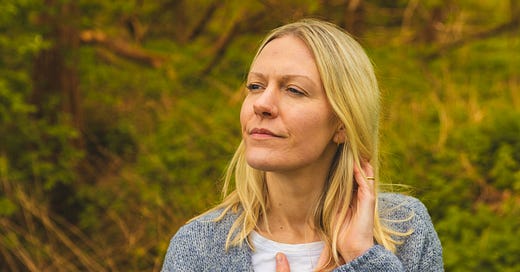My Sobriety Story with Ellie
“I used to spiral for days when drinking. Now, a difficult mental state never lasts more than a day.”
This series showcases personal stories of addiction recovery and sobriety. Today’s edition is by
. Ellie lives with her husband and son in Lewes, East Sussex, where she spends as much time as she can connecting to the natural world. She is passionate about writing, has an MA in Creative and Life Writing from Goldsmiths, and is working on her memoir. Ellie is also a sober mentor and soon-to-be sober coach. You can find her newsletter at .Want to hear Ellie read her story? Hit play here:
When and how did you get sober?
I began my sobriety journey in April 2018, when I discovered This Naked Mind. It was a complete revelation to me. Finally—after years of being trapped in shame and believing that there was something seriously wrong with me and that the only way to get sober was possibly rehab and certainly going to AA meetings for the rest of my life—I was shown another way.
Annie Grace’s work in This Naked Mind taught me that becoming addicted to an addictive substance simply meant that I was a human being and that I was not alone in my experience. There were reasons I had become addicted, and the path to freedom from alcohol meant finding out what my actual needs were and to see whether alcohol was meeting them.
She revealed that there are so many myths and false beliefs about alcohol that our society holds and that we internalize from when we are children. The biggest one is that there are “normal” drinkers and there are alcoholics, and if you are an alcoholic —a label that carries so much shame and stigma—it means that you have an incurable disease.
Annie’s work showed me that, actually, alcohol is to blame—not the person. It freed me from shame and meant that for the first time in my life, the possibility of breaking free from my addiction was possible. Before finding This Naked Mind, I felt trapped, hopeless, and full of shame and despair. Once I began my journey, I felt hopeful and could see all that I would be gaining by quitting drinking, rather than being stuck in the fear of what I thought I would be losing.
Over a period of twenty months, I read Annie’s book, listened to the This Naked Mind podcast every day, did the 30-Day Alcohol Experiment twice (which had a very supportive Facebook group as part of it), and signed up for her 100 Days of Lasting Change emails. I also read The Little Book of Big Change, by Amy Johnson, Alcohol Explained, by William Porter, and many other quit-lit books. I listened to other sober podcasts (there are tons now but weren’t many back then!). And I immersed myself in my mission to get sober. It was my number one priority at that time.
I practiced Byron Katie’s “The Work.” I meditated, did yoga, and rediscovered the healing power of being in nature. I got to know myself—for the first time since I was a little kid. What did I REALLY want? What did I REALLY need? And I questioned whether alcohol was going to meet those needs.
I found loving ways to meet those needs instead and other ways to soothe myself when I was in pain. I wrote a big list and would go to that list when I felt the urge to drink. I told myself: You can still drink if you want to. But try one of these things first. And almost every time, after doing that thing—doing some yoga, going for a walk, eating some delicious food, watching a comedy show—the urge to drink disappeared.
I practiced self-compassion and began my journey (still very much on-going!) to love all the parts of myself—even the addictive voice telling me to drink. Instead of trying to ignore it or tell it to shut up, I turned to it with love and said: “Thank you for trying to help. I appreciate you. I hear you. And I’m not going to drink.” It was like setting a loving limit with a child. It needed to be acknowledged, and when it felt heard, it faded away.
It’s important to note that over those twenty months there were many occasions when I did drink. But I went from drinking almost every day to, in all of 2019, drinking maybe twenty times—a phenomenal achievement. When I did drink, I saw it as an opportunity to get curious about why it happened rather than getting swallowed by shame and a sense of failure. Then, on Christmas Day 2019, I had my last drink and haven’t had another since.
What surprised you about getting sober?
I honestly never realized life could be this good. In the years before getting sober, I thought that I was destined to be miserable my whole life. To be in pain. I couldn’t see a way out. On the other side of alcohol, there’s a life I never could have imagined. Honestly—and I know this might sound a bit OTT but it’s absolutely true—I feel like I’ve been reborn. I feel like I’ve been given a second chance at life. And I am so, so, so grateful.
To be clear: everything isn’t sunshine and roses. But that’s not the deal, that’s never been the deal. Life isn’t about being happy all the time or everything being okay. But what sobriety has brought me is the ability to weather the storms and to take care of myself when things are hard. It means I can actually feel what my needs are and know how to meet them. I used to spiral for days when drinking. Now, a difficult mental state never lasts more than a day.
Sobriety means I get to BE HERE for this one wild, precious, and brief life. To be fully alive.
What’s the biggest challenge you’ve encountered on your recovery journey?
I guess the biggest challenge is just still learning how to be a human! Like most of us, I was never taught or supported to be with all my feelings. I was terrified of them and tried to escape them through alcohol, and also by always being in my head.
Building a loving relationship with myself and the ability to notice my thoughts, to be with what’s here and not get pulled into the story, is an ongoing practice. Some days it’s a LOT harder than others. Sometimes I get really frustrated. I want to be “fixed,” I want to be whole, I want to feel okay all of the time.
I know that the journey to wholeness is actually to accept and love all that is here now. To know that there is nothing to fix. That I am already whole, already perfect, already connected to all the love I could ever need.
I know that, but it’s a continuing practice to embody it more of the time. A journey of remembering and forgetting. Of getting lost in what Tara Brach calls “the trance of unworthiness” and then coming back to myself.
What are the biggest benefits or gifts of sobriety?
Being here for all of it—really BEING here—is the biggest gift I could possibly imagine. Our time here on Earth is so brief. My mother died when she was only 50 and I was 14, so I am acutely aware how short life can be. There’s no time to say “maybe someday” or “when I retire.”
Also, in my late teens and early twenties, I became so desperately unhappy that I didn’t want to be here anymore. So to be where I am today—which is only possible because of sobriety—is just incredible. I wish I could go back in time and show the 20-year-old me what was waiting. I’d give her a huge hug and say: “It’s going to be okay. I’ve got you.”
Not using alcohol to numb my feelings means I finally have my own back. I can practice fierce compassion and be the wise, loving parent I wish I’d had all those years ago. When I am in pain, when I’m struggling, I know what I can do to help.
In the past, I would have just poured alcohol into my body. And it was a big a-ha moment for me when I realized that every time I drank when I was in emotional pain, I was effectively telling myself: “You can’t cope with your emotions, Ellie. You’re not strong enough. Drink this poison and shut up.”
Imagine doing that to a child? Finding their emotions so intolerable that we gave them a carcinogenic poison to shut them up. When I realized how cruel I was being to myself by drinking, well, that was a game changer. And now, of course, through that journey and through that practice, I can reach for love instead of a drink when I’m struggling.
I’m also so grateful that I am parenting without using alcohol. I quit before having my son, who is now 3.5 years old, and to be able to be with him for his childhood completely sober is just incredible. When River is with me, he’s always with ME—not with a version of myself changed by a powerful psychoactive drug. I also don’t know how I would cope parenting while hungover!
What words of advice would you give someone who’s considering sobriety or newly sober?
First of all, you are amazing! You are an absolute hero and warrior. If you can see that alcohol is no longer serving you and are committed to removing it from your life, you have already taken the most enormous step. By breaking free from alcohol, you are giving yourself the gift of self-love.
On this journey—wherever you are on the path—offer yourself fierce self-compassion. Make yourself the number one priority. Nothing is more important than breaking free from this substance. Take excessive care of yourself—especially in the early weeks and months. If you think it’s indulgent or “too much,” brilliant. You’re on the right track.
Quitting alcohol needs to be for YOU, but make no mistake: everyone in your life will benefit from it. The ripple effects will go far beyond your children, partner, immediate family, and friends. You don’t even know yet how your sobriety will help change the world, but it will. By bringing in this love for yourself, you’re making way for more love in the world, for everyone. Truly.
Want to share your sobriety story?
Thank you for sharing, Ellie! We look forward to connecting with you in the comments.
Want to be published on Sober.com? If you’re a sober writer, we invite you to contribute! Reach out to hello@danaleighlyons.com for details.






Thank you so much for sharing, Ellie. Love the audio version!! Similar to you, Annie Grace’s work was pivotal to my decision to get and stay sober. Highly recommend folks check out her books and programs!
You have done so well. Isn’t it amazing how much we gain from stopping drinking? I can relate to your experiences on many levels. Thank you for sharing.